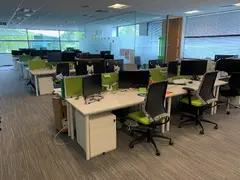Friday, 18th September 2020
 I’m now retired. Perhaps a silly time to retire, working from home was quite easy for me, and the frequent IT issues made it easier. Whenever I was unable to connect to my desktop at work I would have to wait until there was someone in the office to reboot it - they hand-picked those who were allowed into the office. I could have stayed on some months longer and got some more money in the bank - that would have been wise and sensible. But I retired instead.
I’m now retired. Perhaps a silly time to retire, working from home was quite easy for me, and the frequent IT issues made it easier. Whenever I was unable to connect to my desktop at work I would have to wait until there was someone in the office to reboot it - they hand-picked those who were allowed into the office. I could have stayed on some months longer and got some more money in the bank - that would have been wise and sensible. But I retired instead.
I didn’t have the retirement farewell I hoped for, with everyone gathered round my desk, speeches there, and some gift wrapped presents to investigate. Instead I got the very generous collection straight into my bank account (which I preferred as I can spend it how I would like rather than worry what to do with bottles of drink when we don’t really drink ourselves). There was a very nice E-card with unexpectedly kind comments on it, even from managers and the like who must have found me a difficult person to work with at times. We had a Microsoft Teams meeting in lieu of the huddle round my desk.
I enjoyed working for the small Cambridge based software house I joined in 1996, but that enjoyment tailed away when a giant US multinational bought the software house in 2000. At the end it felt one was fighting against the system to get anything done.
So when I started IT was in-house, any problem one could just and go talk to someone and it would be sorted. But inside the multinational IT was virtually a different company who viewed us the users as intruders - the IT head even once said we had to tell him when we wanted to use our computers. Problems could be batted between the different IT departments for days. Our site was effectively down for 3 weeks just before I left.
The multinational relied on metrics to measure everyone, and this led to an internal culture where the winners were those who played the system best not those who did the best work. So you could raise a case to get something done, and it would be closed for a trivial reason - to eventually succeed you would have to reopen the case several times and because you would be dealing with people round the world something simple would take days.
One felt managers mattered most inside the multinational, how far you were up the greasy pole. In the small software house even software developers like me could go to international conferences - in the multinational I got to walk around the office. Managers went to exotic locations for training, it seemed software developers were expected to learn mostly by googling. One hot summer the air conditioning failed and we all complained but nothing happened - turned out the site manager had 5 fans in his office and reported upwards he was alright Jack. Once I got transferred between teams but no one thought to inform me. But I didn’t envy anyone who was a manager, they had continual pressures in the way of meetings and emails and procedures to follow.
The methodology in fashion was called agile but I wasn’t convinced it was an awful lot better than what we had before. There was still wastage, just a different kind of wastage in the various Agile rituals we had to follow. Managers would expand stories that had been committed to then complain if the burndown was poor.
There was no joined up thinking as regards software development. Maintenance of existing systems was zero priority, the demands were always for new features. I’m an old-timer and regard skunk works, developments below the radar, as part of a healthy development organisation.